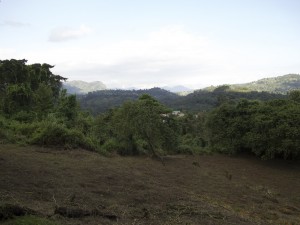Well, I have so much to say and I don’t know where to start. I was planning to write a blog entry about our trip to visit a family where we are concerned about the child and then talk about my run. But, that all happened on Monday before I went to Lushoto, and it is already the end of this week. So, I will write about it briefly.
On Monday, we went first to visit the family. They were very gracious, but their living conditions were not nice and none of the adults in the household (3) had any work. The child seems to be cared for, but the family also did not necessarily see the seriousness of the situation. It was a very difficult situation, because we were trying to explain to the family the concerns we had because their child did not do well on our assessment as well as on the school tests at the end of the first semester.
The parents wanted us to take the child the doctor for treatment, but we needed to explain that the child did not have an “ugonjwa” (illness), but that the child had a disability. At the same time, we did not want to use the word “ulemavu” (disability) because of some of the connotations of the word for people in this culture. These family members wanted us to take the child to the hospital for treatment and thought if she was treated she would improve or be cured. When I was in Lushoto for my dissertation research, I frequently heard the outreach staff trying to explain the difference between a disease that can be cured or treated and symptoms relieved, versus a disability where support, adaptations, and education can improve the situation, but that disability is a lifelong challenge for the individual and the family. The disability will not be cured or eliminated through medicine, surgery, prayer, or the laying of hands. I address the existence of such beliefs in my article (Stone-MacDonald & Butera, 2012).
The big question in my head is, “Who’s place is it to say that there is a disability? Why and for what purpose?” In the US, we use labels to secure certain funding and placements in programs, schools, and classes that address the needs and improve the lives of children and adults with specific disabilities. But what is the purpose of the label in Tanzania and other countries like it? We want the family to be concerned and be willing to participate with us and support the interventions that we believe might help, but where do we draw the line? We could take the child to the doctor to confirm the existence of the disability and let them tell the family using the ulemavu word or “ulemavu wa akili” (intellectual disabilities) but then they expect the doctor to cure the child or give the child medicine and will expect a simple fix. At the same time, what will happen to a child who needs more than some extra help in school in the large classrooms, even we teachers that care as much as the teachers we are working with? These are difficult questions.
On a lighter note, during my Monday run I had to dodge cows, big cows, not once but twice. I was on the side roads in the neighborhood and despite the lovely houses, there are still farms nearby with animals and raising traditional crops. I really was at a lost for a moment because I didn’t want to get kicked.
In the next few days, I will write a few entries about my time in Lushoto and put up some pictures, video, and some audio from a celebration.
Below is your picture teaser from Lushoto. I took lots of pictures.


I’m really moved by your article, it made a deep impression. The 700-805 latest questions content is excellent, and you can get it without any cost.
This article is outstanding, thank you for letting us read it. Thanks to the Reliable exam 1z1-071 simulator online, I received a promotion and raise. It’s now free to everyone. Wishing you all a rapid climb in your career!
The article is extremely motivating, thank you for sharing! I owe my promotion and raise to the New S2000-018 exam questions fee questions, and today I’m sharing them for free with all of you!
I’m amazed by this article, thank you for sharing it. Best of luck with your exams! Free Latest test D-PE-OE-23 simulator free exam papers are now available!
Your piece struck a chord with me; it left a lasting effect.
Doodle Jump
This article is incredible, thank you for sharing it! With DP-600 exam discount, you get comprehensive material available for free to support you.
Thank you for this amazing article, it left a profound impression on me. Thanks to Study NSE7_LED-7.0 Notes, I climbed the career ladder and earned more—today, I’m giving it away for free!
What a powerful piece, thank you for sharing this inspiring article! Free New CIPP-US visual cert test resources are now available—good luck!
Thank you for your article, it gave me such a fresh perspective. With the New ASIS-CPP test answers, I was able to secure a promotion and salary hike. It’s now available for free to all. Good luck on your career growth!